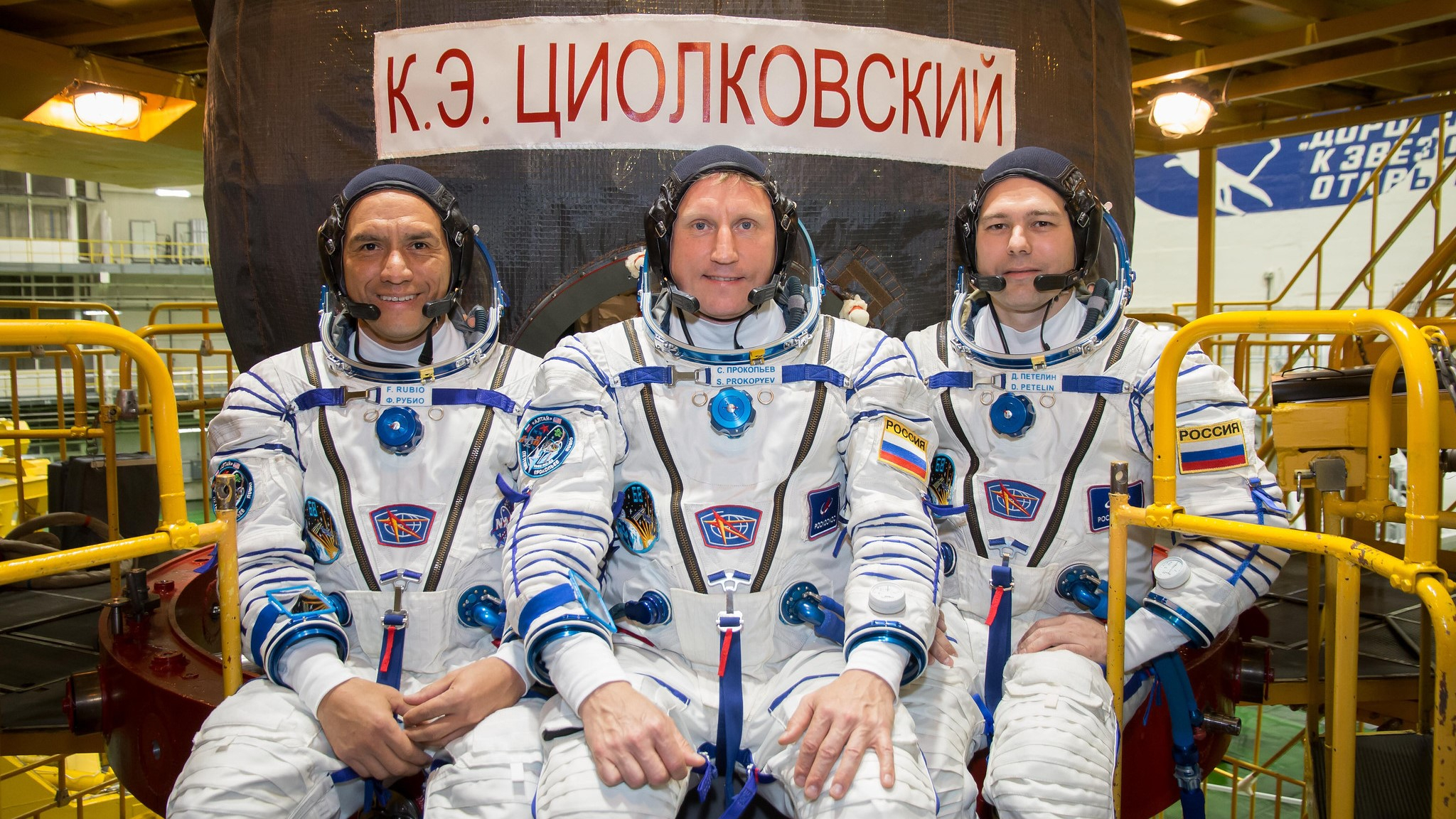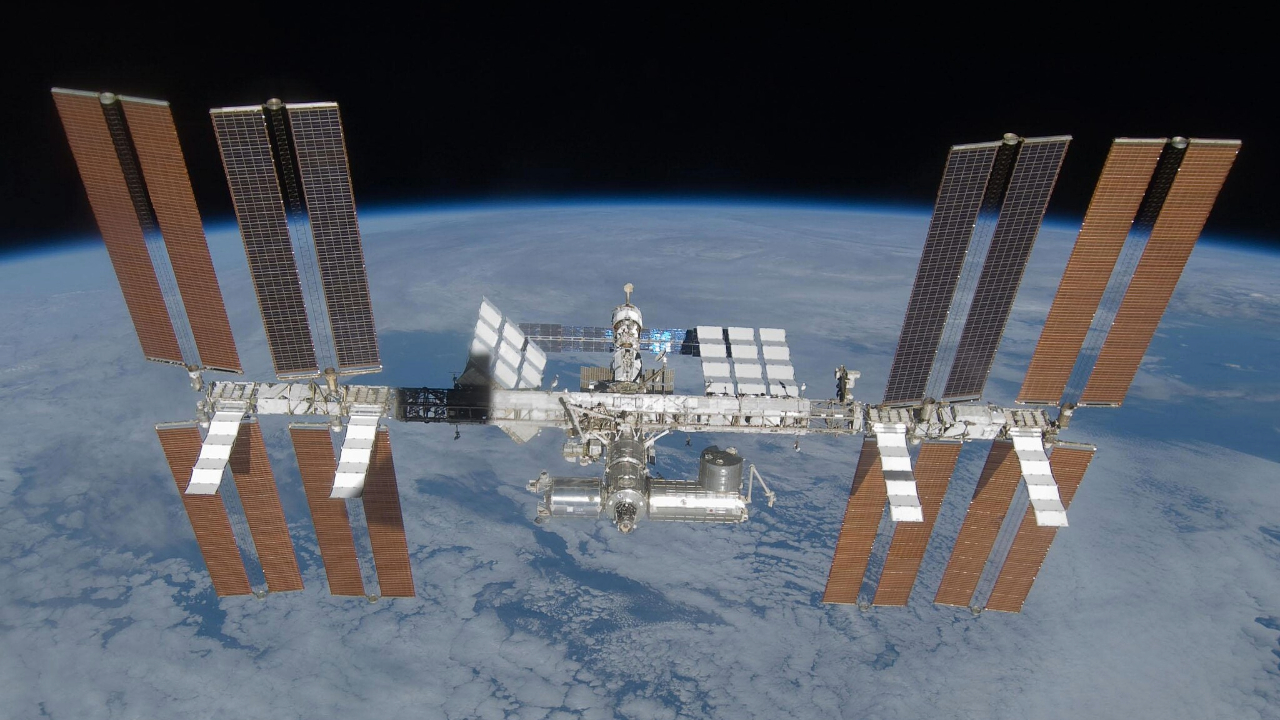Accidental 1-year astronaut crew hands over command of ISS ahead of Sept. 27 landing
'No one deserves to go home to their families more than you.'

Breaking space news, the latest updates on rocket launches, skywatching events and more!
You are now subscribed
Your newsletter sign-up was successful
Want to add more newsletters?
A trio of astronauts will finally go home after unexpectedly spending a year in space.
NASA's Frank Rubio and two cosmonauts from the Russian space agency Roscosmos (Sergey Prokopyev and Dmitry Petelin) handed over their duties to a new International Space Station (ISS) crew today (Sept. 26), a day ahead of their scheduled return to Earth.
"No one deserves to go home to their families more than you," the European Space Agency's Andreas Mogensen, the new ISS Expedition 70 commander, said to the departing trio during a NASA Television livestream on Tuesday (Sept. 26). "We wish you a smooth flight and a soft landing."
A December 2022 leak in the astronauts' MS-22 Soyuz spacecraft, their ride home, doubled their planned six-month mission in space to a year as the astronauts awaited a replacement spacecraft and crew. But the arrival day is nigh; you can watch the three spaceflyers touch down in Kazakhstan on Space.com live Wednesday (Sept. 27) via NASA Television. Touchdown is expected at 7:17 a.m. EDT (1117 GMT or 5:15 p.m. local time).
During the Soyuz crew's 12 months in space, Expedition 69 commander Prokopyev said on the broadcast, the ISS astronauts completed six spacewalks, tested robotics in space and upgraded the station's power supplies — all while managing the arrival of the empty replacement Soyuz MS-23 in February, a full Soyuz MS-24 with crew on Sept. 15, and working on backup emergency escape plans with Mission Control (which luckily never needed to be tested).
MS-23 launched on an accelerated schedule, before its crew (NASA astronaut Loral O'Hara and Roscosmos' Oleg Kononenko and Nikolai Chub) was ready for space. O'Hara, Kononenko and Chub also required yet another Soyuz, MS-24, to be ready to send them to the ISS. All this meant Prokopyev, Petelin and Rubio had to wait an extra six months to return to Earth.
Breaking space news, the latest updates on rocket launches, skywatching events and more!
"This is a very great achievement for us, and I would like to thank all participants," Prokopyev said of the mission on NASA Television in Russian (translation provided by Google). "No matter what, we can work together," he added.
Related: NASA astronaut Frank Rubio surprised by his accidental record in space (video)
The milestone mission leaves Prokopyev, Petelin and Rubio as three of only seven people who have spent more than a year in space continuously; assuming they come home as planned on Wednesday, they will have spent 371 days each in orbit. Rubio also set a U.S. record, easily surpassing the 355-day mark last set by Mark Vande Hei, while becoming the first American to continuously spend a year in space.
"You have shown resilience, professionalism, and grace in the face of unexpected challenges and significant uncertainty," ESA's Mogensen, a Danish citizen, said on the broadcast.
"It's one thing to launch to space, knowing that you're going to be up here for a year," he continued. "It's a completely different thing for you and your families to find out … that you're going to be spending an additional six months in space, but you took it upon your shoulders and you excelled."

Elizabeth Howell (she/her), Ph.D., was a staff writer in the spaceflight channel between 2022 and 2024 specializing in Canadian space news. She was contributing writer for Space.com for 10 years from 2012 to 2024. Elizabeth's reporting includes multiple exclusives with the White House, leading world coverage about a lost-and-found space tomato on the International Space Station, witnessing five human spaceflight launches on two continents, flying parabolic, working inside a spacesuit, and participating in a simulated Mars mission. Her latest book, "Why Am I Taller?" (ECW Press, 2022) is co-written with astronaut Dave Williams.
